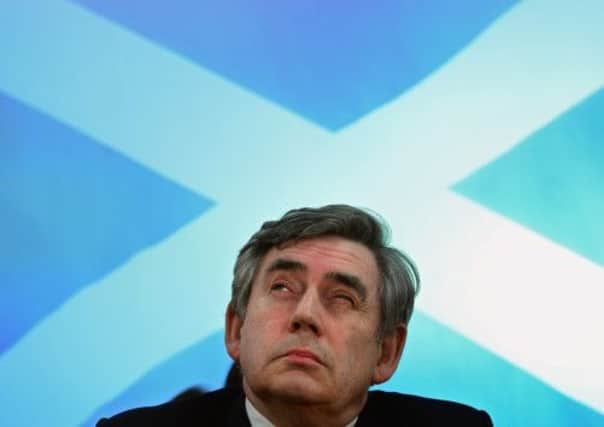Gordon Brown launches Labour ‘No’ vote campaign


Launching Labour’s campaign for the UK, “United with Labour”, the former prime minister admitted that the UK still had a “long way to go” in achieving the party’s aims of social justice.
“The best way forward is to pool and share our resources” across the UK, he insisted.
Advertisement
Hide AdAdvertisement
Hide AdIn her own speech, Scottish Labour Party leader Johann Lamont said that if she had believed social justice would be boosted by independence, she would vote Yes in the referendum.
However, she said she did not believe in “fingers-crossed politics”. She added: “Our political beliefs are predicated on fairness, equality, justice and solidarity”, adding: “I am sorry but I will not kiss goodbye to solidarity because it suits me for now, because I do not like the current prime minister.”
The launch of the campaign is designed to focus specifically on Labour voters as the party seeks to persuade supporters to stick with the UK at the referendum next autumn.
It comes with the SNP attacking Labour for standing alongside Conservative and Lib Dem opponents in favour of the Union at a time of cutbacks, especially to the Westminster-run welfare system.
A group entitled “Labour for Independence” has already been formed, with supporters including former MP Dennis Canavan, to argue that the party would be best advised to vote Yes next year.
However, Mr Brown and Ms Lamont yesterday insisted that there were deeper ties which bound Scotland and England together, and said the party had always believed that, no matter who was in power, “we have always argued that the best way forward is to pool and share our resources so that the benefits flow to those in the UK that need them most”.
Scottish Labour figures from Keir Hardie on had defended the UK system, Mr Brown said. “Was Keir Hardie wrong, stupid, naive? Were all these early Trade Union leaders seduced by the English establishment? Were they conned? Were they brain-washed? No, they understood a belief in equality of opportunity and a belief therefore that we had Scottish values that could be best realised inside the UK.”
He also said there was a “common sense case” for the Union, claiming that an independent Scotland would have to formulate its own plans on pensions and currency. He also criticised the SNP’s commitment to cut corporation tax after independence, saying that such a plan would only see each individual part of the UK outbid one another.
Advertisement
Hide AdAdvertisement
Hide Ad“There would be a race to the bottom in standards and services. And a chance for people to divide and rule,” he said.
Ms Lamont said: “I am clear about what I want. I want social justice. If independence brought us closer to that I would back it. But I cannot see how it does and neither do the SNP or they would have explained it by now.”
Labour’s pro-UK campaign, being run by deputy leader Anas Sarwar, will operate separately to the cross-party Better Together campaign.
Eddie Barnes: Opportunity knocks for nation’s speech writers
The independence referendum is creating uncertainty for business, it is said. Not if your business is in renting conference facilities, hiring public address systems or writing speeches. For them, it’s boom time. Yesterday, in Glasgow, not one but two keynote speeches were on show.
First it was to the enormous new Commonwealth Arena to see Gordon Brown help launch Labour’s own campaign in favour of the UK, “United with Labour”. Brown has spoken on this subject for 50 years but the speech was partly written in the car on the way to the venue.
He had left Fife that morning, he noted, where, in the 1920s, miners had concluded they needed a British welfare state. Then he had got to Edinburgh, where, he observed, the late Labour MP Tom Johnston had led calls for a UK-wide NHS. Then his car had reached Lanarkshire and his thoughts had turned to Keir Hardie and his belief in both a Scottish and UK Labour Party. Perhaps it was just as well he hadn’t travelled all the way from Aberdeen, or we might have been there forever.
Prowling the stage, Brown is still a bear of a political speaker; sometimes woolly, but still not something you would have confidence standing up to. Pro-independence figures rightly respect his challenge.
Advertisement
Hide AdAdvertisement
Hide AdFrom there it was a quick dash into the city centre for part two where Nicola Sturgeon had booked the top floor of the city’s Lighthouse building. The last time the SNP was here was in 2003, when John Swinney launched the party’s ill-fated election campaign.
Things have got a bit better since then. Sturgeon said she didn’t decry the No campaign for backing the Union. No, rather she was troubled by its “apparent willingness to paint Scotland as the poor relation” within it. Salmond-like, she “gently” pointed out to her opponents that they had as many questions to answer as her side did.
This came after she had doggedly ignored a bunch of protesters who had somehow located the venue and decided to try and steal a bit of the referendum limelight by shouting about the closure of some local care homes, a decision which, despite her growing power base, is beyond even Ms Sturgeon’s purview.
But when TV cameras are to hand, who cares? For them – and for conference managers, PA firms and speech writers – the good times are rolling.
READ MORE